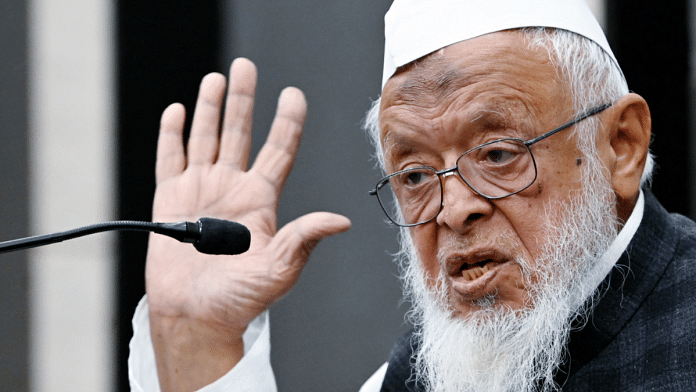New Delhi: A day after the Allahabad High Court dismissed petitions challenging Hindu litigants’ civil suits seeking the right of worship at the Gyanvapi mosque, Jamiat Ulama-i-Hind president Arshad Madani said Wednesday that the organisation will approach the Supreme Court.
Jamiat Ulama-i-Hind is an influential body of Muslim clerics and, according to its website, ‘one of India’s largest’ Muslim organisations. Madani has been heading the organisation since 2006.
“We will take the matter (Gyanvapi mosque issue) to the Supreme Court. We will go as far as the law allows us to go,” Madani said at a press conference in Delhi.
The Allahabad High Court Tuesday dismissed the mosque committee’s and the UP Sunni Central Waqf Board’s petitions challenging the maintainability of a 1991 civil suit on the ground that such suits were against the Places of Worship Act, 1991. In its ruling, the HC called the dispute one of “national importance”.
The court’s ruling came a week after it allowed a primary survey of the Shahi Idgah mosque in Mathura in connection with the Krishna Janmabhoomi case.
When asked about the survey of the Shahi Idgah complex in the Krishna Janmabhoomi dispute, Madani said: “We are not against surveys. We believe that if the survey is conducted honestly, nothing will come out of it. It is our firm belief that mosques are constructed on land meant for it…. It is against our religion to construct mosques on someone else’s land”.
Madani also said it was surprising these matters are being entertained by courts even after The Places of Worship (Special Provisions) Act 1991.
The Act prohibits conversion of any place of worship and provides for the maintenance of the religious character of any place of worship as it existed on 15 August, 1947. The only exception it makes is for the Ram Janmabhoomi-Babri Masjid dispute.
“The 1991 law passed by the Parliament clearly states that no such controversy will be raised in any place of worship, except the Babri Masjid, which has been in existence since 1947. Now these matters are being raised and I’m surprised that the courts are allowing it,” he said.
He also expressed disappointment over the silence of political parties, especially those who formulated the law in 1991, on the developments related to the Gyanvapi mosque complex and the Shahi Idgah complex.
“The silence of political parties is not a good thing. Those who made the law don’t want to come forward today,” Madani said.
Also Read: Gyanvapi case reopens the politics of religion that Supreme Court had sealed shut in Ayodhya
‘Some sectarian people trying to take political advantage’
With the new Ram temple in Ayodhya set to be inaugurated in January next year, Madani said some groups are trying to take political advantage.
“But the Supreme Court in its decision on the Babri Masjid dispute has clearly said that there is no evidence that the mosque was built by demolishing a temple. But now some sectarian people are busy trying to take political advantage of it, and trying to present it as a victory of the majority,” he said.
“Secularism”, he said, means that the state will have no religion. “But things have changed now. Now, politics is being done to please the majority only, not all the citizens of the country. It is destructive for the country’s secular structure and democracy,” Madani said.
(Edited by Uttara Ramaswamy)
Also Read: Kashi Vishwanath trust ex-head says Gyanvapi plea for ‘cheap publicity’, idols not where it claims



